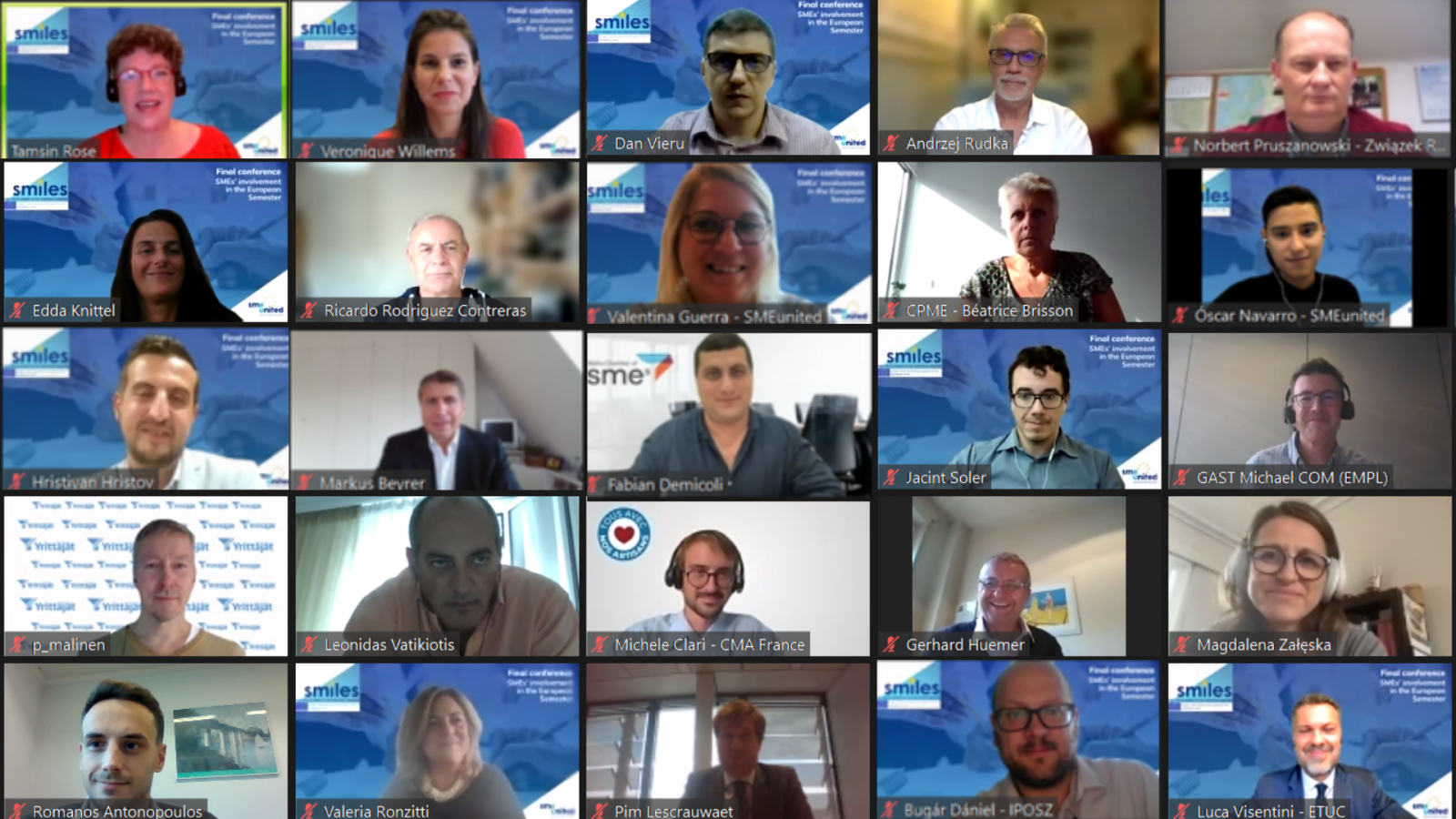Incentives for Bicycles and Bicycle-related facilities launched
23 June 2025
Transport Malta launched a number of incentives for Bicycles and Bicycle-related facilities. This new financial...

On Thursday 16 September 2021, the SMILES project held its final conference on SMEs’ Involvement in the European Semester: stocktaking and the way forward. The 2-year EU-funded project finalised with a rich debate among SMEunited members and the cross-industry social partners, contributing to useful conclusions for the future of the European Semester. The Malta Chamber of SMEs EU and Communications Executive, Fabian Demicoli, participated in this project from the very beginning and provided input on consultation within Malta’s Government structures.
The purpose of SMILES was to create a better understanding of the state of play of SME organisations’ awareness, consultation and involvement in the European Semester and promoting it further through the exchange of good practices, mutual learning and recommendations for future action.
The event brought together the European Commission, Member States, SME organisations representatives and European and national social partners to exchange on how to improve and strengthen the role of social partners and SME organisations in the European Semester.
Opening session
In her opening speech, Secretary General Véronique Willems reviewed the project’s path in the last two years. She emphasised the necessary adaptation of SMILES to the new economic and social reality caused by the pandemic: “We asked our members during the course of SMILES to report and debate about their involvement in the preparation of the National Recovery and Resilience Plans (NRRPs), the use of the EU budget for smoothing the crisis impact and finally for the structural reforms mentioned in the European Semester integrating all major relevant policies for SMEs.”
Presenting the main outcomes of the project, SMEunited Director for Social Affairs, Liliane Volozinskis mentioned the main policy recommendations at European as well as at national level.
National views
In the first session, speakers from national SME organisations CPME from France and CNIPMMR from Romania and social partners, had the opportunity to share their views and give a more ‘hands-on’ experience on the EU semester process. In the second session representatives from GSEVEE (Greece), ZRP (Poland) discussed about the challenges in their involvement in the design of National Recovery and Resilience Plans.
In the first session, speakers shared a more hands-on experience and vision on the European Semester process, representing views from CPME (France), CNIPMMR (Romania) and national social partners, .The second session focused on the challenges for the involvement in the design of National Recovery and Resilience Plans with representatives from GSEVEE (Greece), ZRP (Poland).
The new European Semester process – the way forward
Pim Lescrauwaet, Member of Cabinet of Vice-President Dombrovskis referred to adaptations of the European Semester to the changing circumstances in the last decade. “It is clear that the European Semester and Recovery and Resilience Plans will co-exist in the following years. The European Semester will not become obsolete, it will remain in place to look at the broader policy agenda”, he added.
Valeria Ronzitti, Secretary General, SGI Europe addressed the necessary focus on the regional aspect: “In many Member States, the real implementation is at regional level. A question is how we should tackle this challenge.”
Markus Beyrer, Director General of BusinessEurope emphasised that next to spending money we must ensure the right conditions to create it, hence strengthening growth and competitiveness.
Luca Visentini, General Secretary of ETUC insisted that for a successful European Semester, Next Generation EU with the RRF, the Green Deal and the European Pillar of Social Rights must be fully integrated in the process.
At the end of the conference, SG Willems concluded that a joint call by the European social partners for a systematic, meaningful and timely involvement of national social partners in the European Semester still stands. This is especially through the implementation and potential adaptation of the national Recovery and Resilience Plans by national authorities. She added recommendation on a stronger role for the European Semester Officers, a clear overview of the deadlines for each step of the Semester process and support for capacity building to social partners and SME organisations where necessary.
She emphasised: “It is a unique opportunity to best combine the use of the Recovery and Resilience Facility with the European Semester process. The political decision makers at national level should fully integrate social partners and SME organisations views to have a good bottom-up approach and to learn from the ground what are the real needs after the pandemic shock.”
source: smeunited.eu
The Malta Chamber of SMEs represents over 7,000 members from over 90 different sectors which in their majority are either small or medium sized companies, and such issues like the one we're experiencing right now, it's important to be united. Malta Chamber of SMEs offers a number of different services tailored to its members' individual requirements' and necessities. These range from general services offered to all members to more individual & bespoke services catered for specific requirements.
A membership with Malta Chamber of SMEs will guarantee that you are constantly updated and informed with different opportunities which will directly benefit your business and help you grow. It also entails you to a number of services which in their majority are free of charge and offered exclusively to its members (in their majority all free of charge).